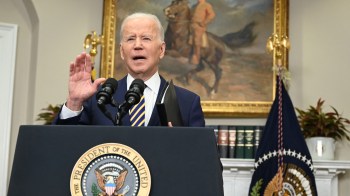Russia’s growth, power running on oil
TEXT OF INTERVIEW
KAI RYSSDAL: Vladimir Putin’s a little peeved at the United States. Today the Russian president accused Washington of leaning on election observers, pressuring them to stay away from parliamentary elections that’re set for this Sunday. Putin’s party is widely expected to win in a landslide this weekend. Which would help him hang onto power when he leaves the presidency this spring. Not hurting either, are the rising prices of oil and natural gas. Putin has parlayed Russia’s huge energy resources into a powerful political tool. Portfolio Magazine writer James Verini wrote about Russia’s, and the world’s, largest energy project, Sakhalin II, this month.
JAMES VERINI: Right now it represents an extremely lucrative export for them. It is the basis for a lot of Putin’s popularity, and a lot of the success of his policies. Also it opens up markets for them, particularly Asia. There are a lot of people who think that Sakhalin is going to make Russia as sort of an energy powerhouse supplying Asia
RYSSDAL: What about the American market? Do they have aims of getting in over here?
VERINI: Oh, absolutely. About 20 percent of Sakhalin II’s gas is going to come to the United States, or at least to North America, the United States and Mexico. Which basically means the Untied States. We do want Russia’s gas, and Russia wants us to buy their gas, for a number of reasons. First of all, natural gas is becoming increasingly important in global energy markets generally. It’s cheaper, and most importantly, we need it. You know, the stuff is running out and we need it to come from somewhere. The environmentalists are making great headway in condemning coal, which is how a lot of our electricity is generated now in the United States
RYSSDAL: When Western oil companies go into the Russian market, they do it obviously with their eyes open. I’m wondering though if they look at the Kremlin’s involvement in a company like Gazprom, not necessarily as a bad thing, but as a positive, as a thing that might guarantee some stability.
VERINI: Absolutely. That’s exactly what western banks, American, and European, and Asian banks are looking for. Yeah, and make no mistake, if we’re not yet buying, you know, a lot of Russian energy, our financial services sector is deeply involved with Russia. As is Europe’s, and increasingly Asia’s. And that’s exactly what, you know, the bankers, and the people who are lending money and the analysts are looking for, is the stability that a connection to the Kremlin and to Putin brings to a company like Gazprom.
RYSSDAL: Is this, in essence, sort of a fragile operation when you think about the scale, and their history? And what’s on the line for Russia as it tries to get this done?
VERINI: Uh, God, I mean I think everything’s on the line. We have to remember in the west, you know, particularly when we want to think ill of Putin, just how much Russia’s history has changed since, you know, 1991, and just how much it’s changed in the last seven years. You have to remember what kind of a country Putin inherited when he came to power in 2000. It was essentially a bankrupt country in which, you know, its citizens had lost all faith in the government, and in seven years Putin has managed to turn a lot of that around. If energy prices stay good, and they can bring these projects to fruition, either then we’re looking at many decades like the last seven years. I think very few people expect that to role on as smoothly as they would like though.
RYSSDAL: The piece by James Verini called “Putin’s Power Grab” is in the current issue of Portfolio Magazine. It’s on newstands now, as they say. James thanks a lot for coming in.
VERINI: Thank you.
There’s a lot happening in the world. Through it all, Marketplace is here for you.
You rely on Marketplace to break down the world’s events and tell you how it affects you in a fact-based, approachable way. We rely on your financial support to keep making that possible.
Your donation today powers the independent journalism that you rely on. For just $5/month, you can help sustain Marketplace so we can keep reporting on the things that matter to you.


















